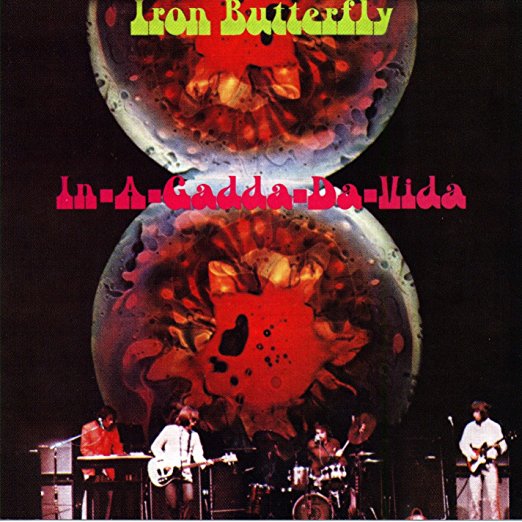 That wasn’t supposed to be the title, of course. In one of the most oft-told tales of happy mistakes in rock, Iron Butterfly member Doug Ingle was so drunk on cheap wine that when he played his new song, “In the Garden of Eden,” for a band mate it came out as “In-a-Gadda-Da Vida.” The band decided to keep it that way, and a classic hard-rock song was born. The track, more than 17 minutes on the album of the same name, slashed down for the single, is often considered one of the seminal tunes of heavy metal.
That wasn’t supposed to be the title, of course. In one of the most oft-told tales of happy mistakes in rock, Iron Butterfly member Doug Ingle was so drunk on cheap wine that when he played his new song, “In the Garden of Eden,” for a band mate it came out as “In-a-Gadda-Da Vida.” The band decided to keep it that way, and a classic hard-rock song was born. The track, more than 17 minutes on the album of the same name, slashed down for the single, is often considered one of the seminal tunes of heavy metal.
Iron Butterfly formed in San Diego in 1966, with Ingle, who died in 2024, on vocals and organ, along with Jack Pinney (drums), Greg Willis (bass) and Danny Weis (guitar). Another singer, Darryl DeLoach, who also played tambourine, soon joined them, and Jerry Penrod replaced Willis on bass before they were signed to a recording contract. Ingle has said that the band’s name was supposed to indicate a contrast between weighty and light, but no one will ever accuse Iron Butterfly of being too soft. From the start, they were going for something louder and more primal and aggressive than other bands of the day, and they titled their debut album Heavy, released on Atco Records in 1968, just to get the point across.
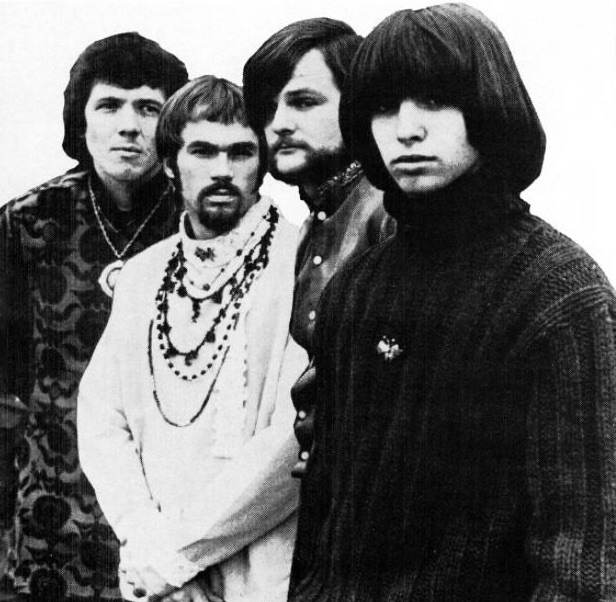
Iron Butterfly classic lineup (l. to r.: Doug Ingle, Ron Bushy, Lee Dorman, Erik Brann
That album reached #78 early in the year and by the summer of ’68 the group was already set to release its sophomore LP. In-a-Gadda-Da-Vida—released on June 14, 1968, and featuring the quartet of Ingle, guitarist Erik Brann, drummer Ron Bushy and bassist Lee Dorman—took its name from its title track, which occupied all of Side B on the original vinyl LP. Most of that time was given over to a post-psychedelic jam that dovetailed with the improvisational music that was being played at ballrooms in the U.S. and abroad and would soon be taken to new extremes by groups that would fall into the just-emerging heavy metal category.
Related: 10 seminal hard rock albums
Lyrically, other than the misheard title phrase, there really wasn’t much to “In-a-Gadda-Da-Vida.” It could have been a ’50s love song. They sang:
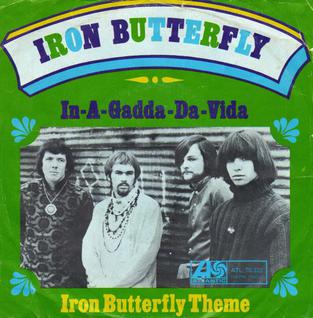
Single picture sleeve
“In a gadda da vida, honey
Don’t you know that I’m lovin’ you
In a gadda da vida, baby
Don’t you know that I’ll always be true”
The chorus, too, was hardly profound:
“Oh, won’t you come with me
And take my hand
Oh, won’t you come with me
And walk this land
Please take my hand”
But it was all in the presentation, and Iron Butterfly found their audience with their second album and its centerpiece. The album, recorded on Long Island, rose to #4 on the Billboard LP chart, while the single, edited down to a more radio-friendly 2:52, found its way to #30 on that chart.
Listen to the single version of “In-a-Gadda-Da-Vida”
Not all rock fans were swayed: “In-a-Gadda-Da-Vida,” and Iron Butterfly itself, were divisive: you either loved the song or despised it. The single and album signaled a shift in rock away from the more flowery, psychedelic sound that flourished at the Monterey Pop Festival and San Francisco’s rock palaces toward something more head-battering.
Related: What else was happening in rock in 1968?
Nonetheless, “In-a-Gadda-Da-Vida” quickly established itself as a rock classic and when the band performed the song live, they often extended it even beyond the 17-minute mark, reportedly reaching a half-hour at times.
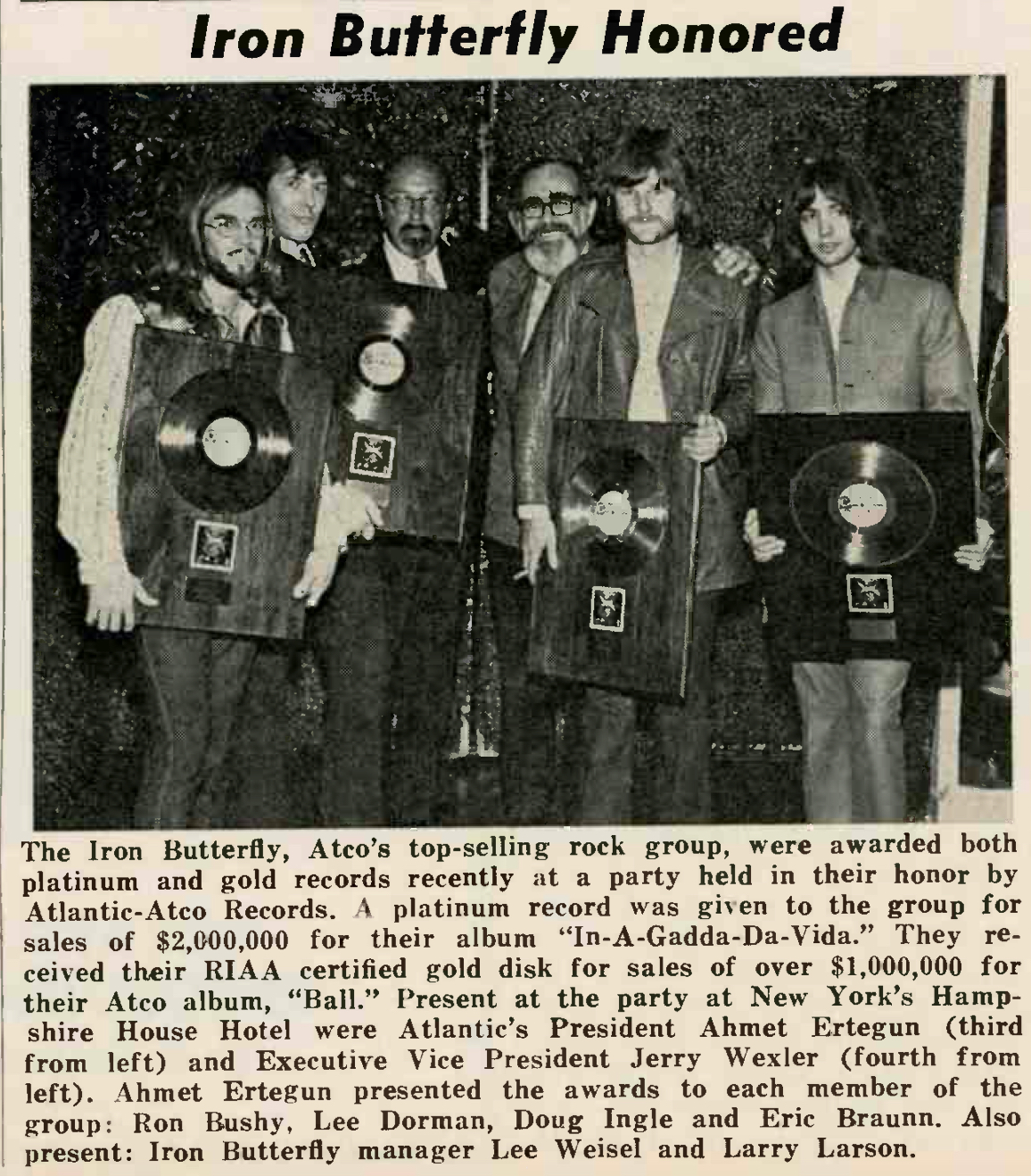
Iron Butterfly receiving their awards. Photo appeared in the Sept. 6, 1969 issue of Record World.
The In-a-Gadda-Da-Vida album has been certified multi-platinum, reportedly selling more than 30 million copies total. (Iron Butterfly was, in fact, the first-ever group to receive an RIAA platinum album award.)
Iron Butterfly continued to find success for some years after 1968. Their next album, 1969’s Ball, reached #3, and the group was scheduled to play Woodstock but missed the gig when the helicopter meant to transport them to the site failed to show up. The 1970 Live album included a 19-minute version of “In-a…” and reached # 20, followed just a few months later by the #16 Metamorphosis.
But as the ’70s unfurled, and other trends and bands came into the picture, audiences moved on. Iron Butterfly disbanded in 1971 but by ’74 a new lineup had revived the name, and they’ve never gone away. In recent years, there has been an Iron Butterfly band, featuring one early member, Ron Bushy—although there has been no new Iron Butterfly album release in more than four decades. [The classic album is available here.]
Watch the 1968 lineup play the full 17-minute version of “In-a-Gadda-Da-Vida”




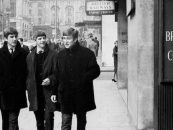

15 Comments so far
Jump into a conversationThere should have been a 50th Anniv. release of this iconic album. IB should be in the RRHOF.
Absolutely on both counts!
MY RECORDING OF ARE YOU HAPPY IS ON YOU TUBE…I WAS AT THE SF POPS FESTIVAL AND SAW THEM…some of IN A GADA is on the tape too GEORGE FEIST
This album was innovative when it first came out. Now it is simply dated. Yes, I bought the vinyl in 1968
Still have the vinyl version. IB was my very first concert at Santa Clara County Fairgrounds in 1969.
Catchy song that somehow lost its appeal after I stopped drinking back in 1975. Nice rhyme of you and true though.
I’m going to guess that many folks were like me, back in the day, and, initially only listened to their one masterpiece from IB. But if you want a treat, pick up their greatest hits CD. You may be surprised at how beautiful the rest of their music was, and how befitting their name really was, with many traces of other California bands and sounds mixed in. If you like west coast music from the 60s, you’re in for a treat.
I found the album one day in high school in our family record cabinet summer of 1981. Not long after listening to it went my hand drawn florescent painted poster that said Iron Butterfly. Right next to my other hand drawn poster that said The Byrds. Also painted in florescent colors. I was the only flower child in my high school. Along with the punk rockers, new wavers, mods, and heavy metal head bangers. You’d think i’d blend in, but they didn’t know what to do to me. Iron Butterfly’s album In-A-GADDA-DA-VIDA was my anthem. 1981 was my summer of love.
Always wanted to know what kind of fuzz box Erik Brann used on the title song. Anyone know out there?
Loved the 17-minute version then and still love it today. Wish they’d play it more often on the classic rock stations.
Good to know that they’re still walking this land. I was more of a fan of Zappa In-a-gada-Sravinsky.
Too bad their Instruments, & Doug’s voice, are all “lip syncing” to their album. Notice no instrument cables coming from the Guitar, Bass or Keyboard? And Ron’s not, at times, in sync with the Drum parts? I would’ve really enjoyed, immensely, them ACTUALLY performing….”oh well!….”
Hard to believe that this was actually nothing more than a soundcheck for the studio engineer while they waited for the producer to show up. They kept the tape rolling and ended up keeping this version.
“…the group was scheduled to play Woodstock but missed the gig when the helicopter meant to transport them to the site failed to show up.”
Not exactly how it happened according to Woodstock organizers. Per Michael Lang (RIP): “Iron Butterfly was booked for Sunday afternoon, but John Morris [production coordinator and stage MC] told me that their agent had called with a last-minute demand for a helicopter to pick them up.… Apparently the agent had a real attitude, and we were up to our eyeballs in problems. So I told John to tell him to forget it; we had more important things to deal with.”
And:
“In Pete Fornatale’s Back to the Garden, released this June, John Morris explained that his telegram was only a conclusive response to the Butterfly people: “They sent me a telegram saying, ‘We will fly to LaGuardia. You will have helicopters pick us up. We will fly straight to the show. We will perform immediately, and then we will be flown out.’ And I picked up the phone…got a cooperative lady at Western Union…and said:
‘F or reasons I can’t go into
U ntil you are here
C larifying your situation
K nowing you are having problems
Y ou will have to find
O ther transportation
U nless you plan not to come.’ ”
Arrogance has a price.
https://www.sandiegoreader.com/news/2009/aug/12/blurt4/
I knew Charlie Greene who claimed to have produced this recording. He said it was “In the Garden of Eden”. Odd that no one addresses this remarkable “There’s a bathroom on the right!” syndrome.